 |
Dear Daphne, What
is the Scientific Method?
 SCIENTIFIC
METHOD is: OBSERVE - HYPOTHESIZE - TEST. SCIENTIFIC
METHOD is: OBSERVE - HYPOTHESIZE - TEST.
It is the experimental method. It is objective. A scientist
does not decide how things should be, but observes how things are.
It is a controlled experiment. Scientific method strongly emphasizes
empiricism and rationalism.
A Controlled Experiment contains the following types of variables:
a "Manipulated" Variable, a "Responding" Variable
and Controlled Variables. MORE
Dear Daphne, Scientific
Method is great for older students and Science fairs, but how do
I teach it to a 5 year old?
 You
don't teach it, as the instructor, you follow Scientific Method
as your process, encouraging research, asking "what do you
think will happen?" and asking "why do you think that
happened?". Encourage your Scientist to record what they see,
in the form of drawings or by dictating their observations to someone
who can write or type! Scientific Method is a good discipline to
start early in your Science career! You
don't teach it, as the instructor, you follow Scientific Method
as your process, encouraging research, asking "what do you
think will happen?" and asking "why do you think that
happened?". Encourage your Scientist to record what they see,
in the form of drawings or by dictating their observations to someone
who can write or type! Scientific Method is a good discipline to
start early in your Science career!
|
Dear
Daphne, Do you have any favorite spots where you like to hang on the
Internet?
 www.google.com
- where would a pig be without google? I also like to go to www.carolina.com for supplies, thought they
don't have grapes or orange candy! There is a high interest in Physics
in our laboratory, so sometime we find good stuff at: www. physlink.com . But our absolute, all
time favorite spot is www.howstuffworks.com. www.google.com
- where would a pig be without google? I also like to go to www.carolina.com for supplies, thought they
don't have grapes or orange candy! There is a high interest in Physics
in our laboratory, so sometime we find good stuff at: www. physlink.com . But our absolute, all
time favorite spot is www.howstuffworks.com.
Dear Daphne, How do
I use google.com?
 Where
would a pig be without google? Google is really easy to use. Google
usage instructions. Where
would a pig be without google? Google is really easy to use. Google
usage instructions.
Dear Daphne, We're
studying Quantum Physics and we are looking
for anything on Stephen Hawkings...
 You
can write to Stephen Hawkings and direct your questions to the man
himself. He has a web site: Stephen Hawking's Website. PBS also has a
great section: Stephen Hawking's Universe You
can write to Stephen Hawkings and direct your questions to the man
himself. He has a web site: Stephen Hawking's Website. PBS also has a
great section: Stephen Hawking's Universe |
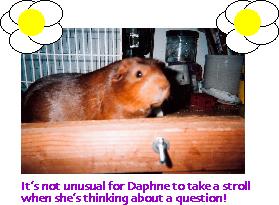 |
Dear
Daphne, I am wondering how you learned how to type?
(TOP)
 I have
been trying to teach my chinchilla, but to no avail. I bet it was
all that extensive homeschooling you gave her, huh? My chinchillas,
Ramses and Amenhotep were working with Timon and Pumba and that typing
tutor Mavis Beacon (http://www.mavisbeacon.com/),
but then their mom said, nope, no more 9.x games on my computer. OS
X or else! (We love our Macs!) So, now they are stuck! I do let them
practice on the laptop on occasion, but they shoved it off the desk
and broke the screen, now they spend too much time staring at the
"ink blot" on the LCD screen instead of working on their
typing skills. (They are convinced its a "Chinchilla Rorschach
Test!"). My cats on the other hand, can type quicker than I do...go
figure? What are your secrets? Cindy - Utah I have
been trying to teach my chinchilla, but to no avail. I bet it was
all that extensive homeschooling you gave her, huh? My chinchillas,
Ramses and Amenhotep were working with Timon and Pumba and that typing
tutor Mavis Beacon (http://www.mavisbeacon.com/),
but then their mom said, nope, no more 9.x games on my computer. OS
X or else! (We love our Macs!) So, now they are stuck! I do let them
practice on the laptop on occasion, but they shoved it off the desk
and broke the screen, now they spend too much time staring at the
"ink blot" on the LCD screen instead of working on their
typing skills. (They are convinced its a "Chinchilla Rorschach
Test!"). My cats on the other hand, can type quicker than I do...go
figure? What are your secrets? Cindy - Utah
 Dear
Cindy in Utah, Dear
Cindy in Utah,
I really don't type, my humans think I do though. I use I-Listen from
Apple. It's really quite easy to order online. I talk to the computer
and it listens! Here's a review: http://www.applelinks.com/mooresviews/il101.shtml
My humans think it is a great tool for those students who have difficulty
with using a pencil, something about small motor problems, (everything
I have is small motor!) so the tool doesn't get in the way and the
stories get written! It's also great in the Lab for writing Science
reports!
Daphne |
 |
Dear
Daphne, How do weather satellites work? How big are weather satellites?,
How far away from the earth are they? Do they ever come out of orbit?
DD
(TOP)  Dear
DD, Dear
DD,
Very Interesting Questions! One of my favorite Internet places is
www.howstuffworks.com.
A general answer to how satellites work can be found at: http://science.howstuffworks.com/satellite.htm
An excerpt from the page:
In this edition of How Stuff Works, by Gary Brown, we will show
you how satellites operate and what they do. You'll get to see what's
inside a satellite, explore the different kinds of orbits and find
out why the intended use of the satellite affects the choice of
orbit. We'll even tell you how to see and track a satellite yourself!
You will find satellite images from NASA at: http://www.ghcc.msfc.nasa.gov/GOES/
The University of Wisconsin department of Physics provides an introduction
to weather satellites: http://physics.uwstout.edu/wx/wxsat/wxsat.htm
Lockheed Martin also has an informative website: http://www.thetech.org/exhibits/online/satellite/3/3c/3c.1.html#weather
and http://www.thetech.org/exhibits/online/satellite/home.html
I hope this helps in your studies!
Daphne
|
Dear
Daphne, I found out that Guinea Pigs were
and still are considered a delicacy by South Americans. AL
 Dear
AL Dear
AL
I read that in a copy of Smithsonian Magazine recently and found
that rather disturbing as well. SO I am offering this chemistry
experiment, Chicha
de Maní, a fermented peanut drink to help you focus on
other culinary areas of South America!
(TOP)
|
| Dear
Daphne, I am hosting science club for our co-op next Thursday.
We are going to study rocket boosters and build small
paper rockets. I picked up several resources from the library, but
what I was hoping was to get a good web link for a virtual field
trip regarding rockets. Do you have any in your repertoire that
might be useful? Thanks, Terri (TOP)
 Dear
Terri, Dear
Terri,
WOW! Rockets are the coolest! We have a collection of model rockets
in our lab! It depends on what you really want to see in a field
trip and what the age group is. Here are the sites I have collected,
the best being "How Stuff Works" for a field trip: http://science.howstuffworks.com/rocket.htm
"One of the most amazing endeavors man has ever undertaken
is the exploration of space. A big part of the amazement is the
complexity. Space exploration is complicated because there are so
many problems to solve and obstacles to overcome. The biggest problem
of all is harnessing enough energy simply to get a spaceship off
the ground. That is where rocket engines come in. Rocket engines
are, on the one hand, so simple that you can build and fly your
own model rockets very inexpensively."
Other sites:
Kennedy Space Center Launch schedules and live video: http://www.ksc.nasa.gov/
J et propulsion at NASA: http://www.jpl.nasa.gov/
MIT:
http://web.mit.edu/dept/aeroastro/www/labs/SPL/home.htm
MIT has a long tradition in space engineering research. From Apollo
to the newest space observatories the institute's contributions
continue to provide state-of-the-art solutions for challenging problems.
The mission of MIT's Space Propulsion Lab is to continue this tradition
by developing advanced propulsion technologies for spacecraft of
the 21st century.
The
National Association of Rocketry: http://www.nar.org/
The National Association of Rocketry is the oldest and largest sport
rocketry organization in the world. Since 1957, over 80,000 serious
modelers have joined the NAR to take advantage of the fun and excitement
of organized rocketry!
Here
is a list of all the topics available from the Beginner's Guide
to Model Rockets site. http://www.grc.nasa.gov/WWW/K-12/airplane/shortr.html
The
Beginner's Guide to Aeronautics: http://www.grc.nasa.gov/WWW/K-12/airplane/index.html
The Beginner's Guide to Aeronautics (BGA) was created as a Web-based
"textbook." The creation of the BGA is a research project
to explore the use of the personal computer and the Internet to
present educational materials to students, teachers, and lifelong
learners in a more interactive way than a printed, bound textbook.
The
Beginner's Guide to Model Rockets: http://www.grc.nasa.gov/WWW/K-12/airplane/bgmr.html
The Beginner's Guide to Model Rockets will show you the basic math
and physics that govern the design and flight of model rockets.
Unlike full size rockets, aerodynamics plays a major role in the
flight characteristics of a model rocket. At this Web site you can
study how model rockets operate at your own pace and to your own
level of interest. Because the flight of the rocket involves the
interaction of forces on the rocket, we have included several pages
on the fundamentals of forces. Because aerodynamics is involved
with the motion of the rocket, there are several pages devoted to
basic gas properties and aerodynamic forces. There is a short index
of topics that you can access from any page, so you are never more
than two clicks away from any other Web page at this site.
I
hope this helps at your science club meeting!
(TOP)
Daphne - the Science Guinea Pig
|
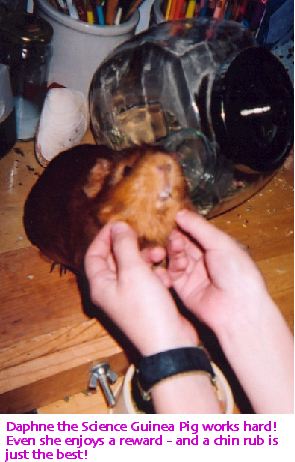
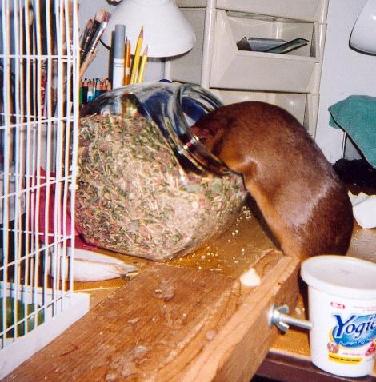
|
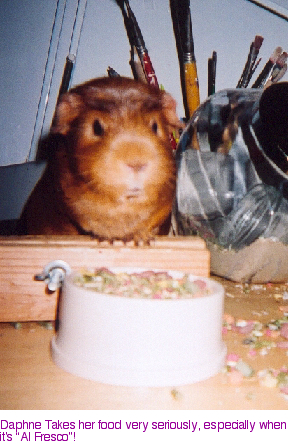 |
Dear
Daphne, Our is group is going to study glass and how
glass is made. Do you know how glass is made?
Thanks, G (TOP)
 Dear
G, Dear
G,
Glass making is an interesting process. Did
you know Corning Glass has a virtual tour you can take? http://pt3.sbu.edu/VFTs/Corning/index.htm
"How
Glass is Made"
Written by Steve W. Martin, Ph.D., Professor of Materials
Science and Engineering, Iowa State University
" No other kind of factory looks like a glass plant.
Huge bins called silos hold the raw materials for glass making.
These materials are powders that look much alike but can produce
greatly different results. Giant roof ventilators and huge
stacks release the terrific heat required to melt these powders
to a white-hot liquid. At the hot end of the plant are the
furnaces"....read
more
I
hope this helps.
Daphne - the Science Guinea Pig
|
|
| Dear
Daphne, I am going to be preparing a unit on Earth Sciences.
Do you have any suggestions for worthwhile material? signed
JJ.
 Dear
JJ, Dear
JJ,
There are so many directions you could take
a Unit study on Earth Science. A good general resource is
the "Exploring Earth" website. It is supposed to
accompany a textbook, but often textbooks are boring and often
inaccurate, so maybe just use the web site, it looks really
worthwhile: Exploring
Earth. At this web site the "Investigations"
and "Visualizations"
are the items I would blend into a Unit Study.
Being
a small creature, I am always interested in the weather. Cold
weather can be rough on us little guys. One place I have found
a good unit on weather is in the United Kingdom. It's called
Four Seasons. At this website you'll find a good manual, broken
up into four manageable PDF files and several worksheets.
You can also access the database the schools in England are
generating. Four
Seasons
I
also enjoy the Geology part of Earth Science. One Internet
stop I like is the University of California, Berkeley Museum
of Paleontology, Geology
wing. The other thing that is fun to do in Utah is to
go digging for Trilobytes in Delta, Utah: U-Dig
Fossils
You really can't have a unit on Earth Sciences without a section
on volcanoes! A primary focus of volcanology is to provide
scientific and educational information that can lead to hazard
mitigation. Michigan
Tech's Volcanoes page aims to provide information about
volcanoes to the public and to complement other informational
sites on the web. The U.S.
Geological Survey is another favorite spot for studying
volcanoes. A great movie you can view is: Island of
fire: [Montserrat's violent volcano] a National Geographic
explorer video available at the library.
I hope this helps.
Daphne - the Science Guinea Pig
Dear
Daphne, I have such a tough time with some topics in Math.
Do you have resources to to help us in Math!
Luvin5
 Dear
Luvin5, Dear
Luvin5,
Math is such a broad topic. I have been keeping quite a bit
of Math information on another webpage. I guess it migh be
time for me to unveil it! <See Daphne's
Math pages>
I hope this helps.
Daphne - the Science Guinea Pig
|

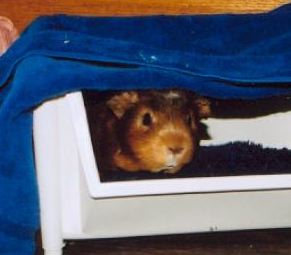
|
Dear
Daphne,
What is the best way to learn how to build
a webpage? drvoltz
 Dear
drvoltz, Dear
drvoltz,
The best way to learn how to build a web page is to just do
it. There are some great books available: Creating
Web Pages for Dummies, Sixth Edition, Creating
Web Pages for Kids & Parents (The Dummies Guide to Family
Computing) We like the humor in the "Dummies"
series books. There are also some great online spots to learn
how to build a website:
Html Basix
contains a good variety of tools for the beginner through
to the advanced webmaster who's looking for a snippet of code
to place in their page.
webmonkey
for kids - Learn everything you need to know about building
your own homepage. Make an online birthday invitation, slide
show, self-portrait, and more.
build-website.com
- This website development guide
explains how to design, develop, publish and promote a simple
web page. It introduces important web development concepts,
methods, techniques and tools.
The
other thing you can do is invest in a WYSIWYG development
tool. You basically lay out how you want your web page to
look and it creates all the HTML code you need. All you have
to do is publish the pages. We use Dreamweaver
from Macromedia to
develop this website.
If you do choose a WYSIWYG, like Dreamweaver, Adobe GoLive,
or Microsoft Frontpage, there are "dummies" books
available that are a huge help: Dreamweaver MX 2004 for Dummies,
Adobe GoLive 6 for Dummies, Microsoft FrontPage 2002 for Dummies
(With CD-ROM)
So now you can get started!
Daphne - the Science Guinea Pig |
 Daphne
on the topic of Botany Daphne
on the topic of Botany
 Sometimes
I get invited along on the adventures my "people"
take. They often travel as part of school and we recently
went to Florida to study Botany. Not that Florida wasn't great,
the bathing suit was a bit much. I preferred exploring the
nearby orange grove to swimming. Our Botany project includes
finding, photographing and identifying 40 vascular and 5 non-vascular
plants as a springboard into Botany. Operating the camers
is not what I do best, I did however manage to find some great
books to help us in our study: Sometimes
I get invited along on the adventures my "people"
take. They often travel as part of school and we recently
went to Florida to study Botany. Not that Florida wasn't great,
the bathing suit was a bit much. I preferred exploring the
nearby orange grove to swimming. Our Botany project includes
finding, photographing and identifying 40 vascular and 5 non-vascular
plants as a springboard into Botany. Operating the camers
is not what I do best, I did however manage to find some great
books to help us in our study:
Botany
in a Day: The Patterns Method of Plant Identification
by Thomas J. Elpel
Guide
to the Vascular Plants of Florida by Richard
P. Wunderlin, Bruce Hansen, Bruce F. Hansen
Florida
Wild Flowers and Roadside Plants by Ritchie C.
Bell, Bryan J. Taylor
 More
Botany Questions More
Botany Questions
Dear
Daphne,
I have a dilemma that I hope you can help me with. What was
the difference between a fruit and a vegetable? Hope you can
help.
It
depends on who you ask, a botantist or horticulturist. The
big question to ask is, DOES IT HAVE SEEDS? If the answer
is yes, then technically, you have a FRUIT. This, of course,
makes your tomato a fruit. (For all practical purposes I say
its a fruit. It's legal and technical mumbo-jumbo that claims
it to be a vegetable.) This defintion also also makes cucumbers,
squash, green beans and walnuts all fruits as well. VEGETABLES
such as, radishes, celery, carrots, and lettuce do NOT have
seeds (that are part of what we eat) and so they are grouped
as vegetables. Now don't go looking for tomatoes next to the
oranges in your grocery stores. Certain fruits like tomatoes
and green beans will probably always be mostly referred to
as "vegetables" in today's society.(Reference:
Yard
& Garden Solutions)
Hope
that helps.
Daphne the Science Guinea Pig
|
| 
 Dear
Daphne, How do ThermaCare™
Heat Wraps work? C.C. Dear
Daphne, How do ThermaCare™
Heat Wraps work? C.C.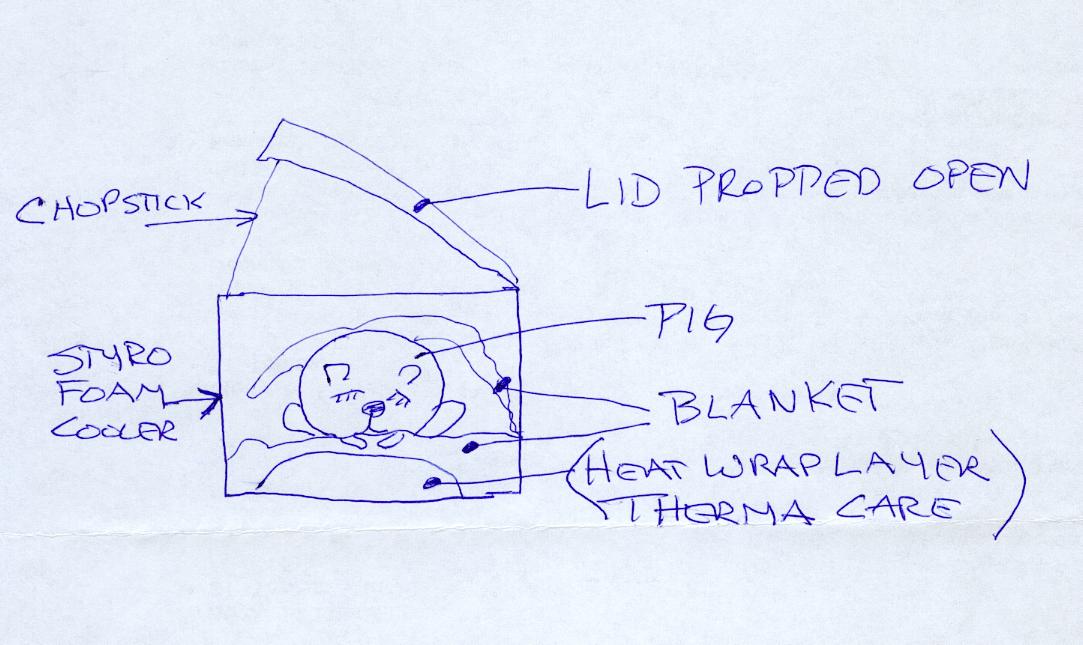
Dear
C.C.
I recently had experience with this remarkable product. As
I have written before, my "people" take me on their
adventures with them and our trips to Yellowstone National
Park and Mt. Rushmore were no different except that instead
of the usual royal treatment, I got to go camping. Being the
caring owners that they are, my "people" treated
me to a night in a large styrofoam cooler with fluffy blankets
and a ThermaCare™ Heat Wrap. It was the best idea yet
and I was so thoroughly comfortable, I didn't want to get
up in the AM. I also wondered how ThermaCare™ Heat Wraps
work and here's what I found:
How
do Hand Warmers Work? (an expirement - hand warmer explanation
is mid page)
More
on handwarmers,
ThermaCare™
describes it too...
Sincerely, Daphne, the Science Guinea Pig
 Dear
Daphne, How do
you think the Intel processor is going to affect the Mac? Dear
Daphne, How do
you think the Intel processor is going to affect the Mac?
From:
Alex, Katie and Cindy
Dear Alex, Katie and Cindy,
In General I think the Intel chip for Apple is a good thing.
It's going to affect marketing Apple products more than anything.
I am on a Mac now and my "people" have used Macs
since 1982 - Apple diehards, so I expect to see good things.
I think it will be in true Apple style, a smooth transition
without too many hiccups. The PR people at Apple have thier
jobs cut out for them.
In a nutshell:
Technically - we'll see a G5 soon.
From a hype point of view - Apple wants more market share,
nobody likes Microsoft and Apple wants to ride in and save
the day. Apple also wants to sell more iPods and make the
music and movie industry happy by providing a secure platform
for their products. Intel chips provide that technology now.
One good resource for stuff like this is a fellow homeschooler
Shawn K. Hall at:
http://reliableanswers.com/
When I asked him what he thought, he basically said technically
it's a bleep on the radar and then provided this analogy that
I like very much:
"If you had the option of buying one of two cars
today. One is cheap and is ridiculed primarily because the
drivers don't know their left from their right. The other
is a little more expensive (maybe it has labeled arrows on
the steering wheel?), and has a much more dedicated fan base.
Each is comparable in every other way - warranty, features,
safety... but you know that after only one year the vendor
for option #2 is going to completely stop providing fuel for
their vehicle. Which one do you choose? Are you going to place
your money, as a consumer, on a car that's effectively sold
to you with a matching tombstone and a ticking time-bomb under
the hood?"
I also read some other opinions before forming my own:
Going
for Broke: Apple's Decision to Use Intel Processors Is Nothing
Less Than an Attempt to Dethrone Microsoft. Really.
By Robert X. Cringely
MacWorld
June 06, 2005
Intel-Apple:
A First Reaction
By Jason Snell
"Why did it do it? Steve Jobs himself pointed to
two key facts that anyone following the Mac for the past two
year will already know by heart: Two years ago, Jobs promised
a 3-GHz Power Mac G5, and it still doesn’t exist; and
there are still no G5-based PowerBooks anywhere to be seen.
"
Hope you have a great summer!
Best Regards,
Daphne the Science Guinea Pig
|
 Dear
Daphne: I'm curious. What's a "nurb?" signed, An
autodidact from Charm, o-HI-o Dear
Daphne: I'm curious. What's a "nurb?" signed, An
autodidact from Charm, o-HI-o
DAPHNE
on NURBS
In
short, a NURB is the acronym for Non-Uniform, Rational, B-splines.
NURBs are used in surface modeling or 3-D imaging on computer
screens. The field of geometric modeling is huge, especially
if you are an engineer planning on going into the field of
mechanical computer aided engineering (MCAE). Some pages that
explain NURBS:
The
Dirty Little Secrets of NURBS by Stephen M. Hollister,
New Wave Systems, Inc.
Rendering
NURB Regions for 2D Animation by R J Oddy and P J Willis
Computing Group School of Mathematical Sciences University
of Bath Bath, Avon U.K.
There
are several products available that use B-spline, NURB curve
and surface technology:
Pilot
3D-CAD, AutoCAD
, I-deas
NX Series
Engineering companies that use this sort of technology NASA,
BMW, Ratheyon, Boeing, Proctor & Gamble.
Hope
that helps,
Best Regards,
Daphne the Science Guinea Pig
|
 Dear
Daphne: I
need you to settle a debate that I have with some engineer
friends. Which will make ice cubes faster, warm water or cold
water? signed,
peacemaker Dear
Daphne: I
need you to settle a debate that I have with some engineer
friends. Which will make ice cubes faster, warm water or cold
water? signed,
peacemaker
Dear
Peacemaker,
We
have that debate here, though I am fond of making ice with
cold water in the summer and warm in the winter. Faster isn't
an issue for me, I have all the time in the world, though
from what I found, warm water freezes faster:
|
From
the SciBoard operated by the Electrical and Computer
Engineering Department of the University of Louisville:
Q.
Does hot water freeze faster?
Ans. You put two pails of water outside on a freezing
day. One has hot water (95 degrees C) and the other
has an equal amount of colder water (50 degrees C).
Which freezes first? The hot water freezes first! Why?
[read
on]
I
also love to read "The Straight Dope, and here
is what Cecil Adams had to say on the topic:
Which
freezes faster, hot water or cold water?
The Straight Dope: by Cecil Adams
You were smart to let me handle this.... God knows what
would happen if you tried to experiment with ice cubes
on your own."[read
on]
It
is always good to consult a physics guy at a University:
Can hot water freeze faster than cold water?
1998 by Monwhea Jeng (Momo),
Department of Physics, University of California
Yes -- a general explanation: Hot water can in fact
freeze faster than cold water for a wide range of experimental
conditions..[read
on]
And I always
look to the guys who would use this idea for practical
reasons:
The
FORUM ON BEER, HOMEBREWING, AND RELATED ISSUES says
" Hot Water freezes faster, yes, it really does."
But
if you don't trust my resources go to the library and
check out these publications(all of the resources I
found online sited these articles):
"Hot
water freezes faster than cold water. Why does it do
so?",
Jearl Walker
The Amateur Scientist, Scientific American,
Vol. 237, No. 3, pp 246-257; September, 1977.
"The Freezing of Hot and Cold Water"
G.S. Kell
American Journal of Physics, Vol. 37, No. 5, pp 564-565;
May, 1969.
|
 |
So
I hope that settles the debate,
I know it did around here!
Best Regards,
Daphne the Science Guinea Pig
|
|
|
|
|

